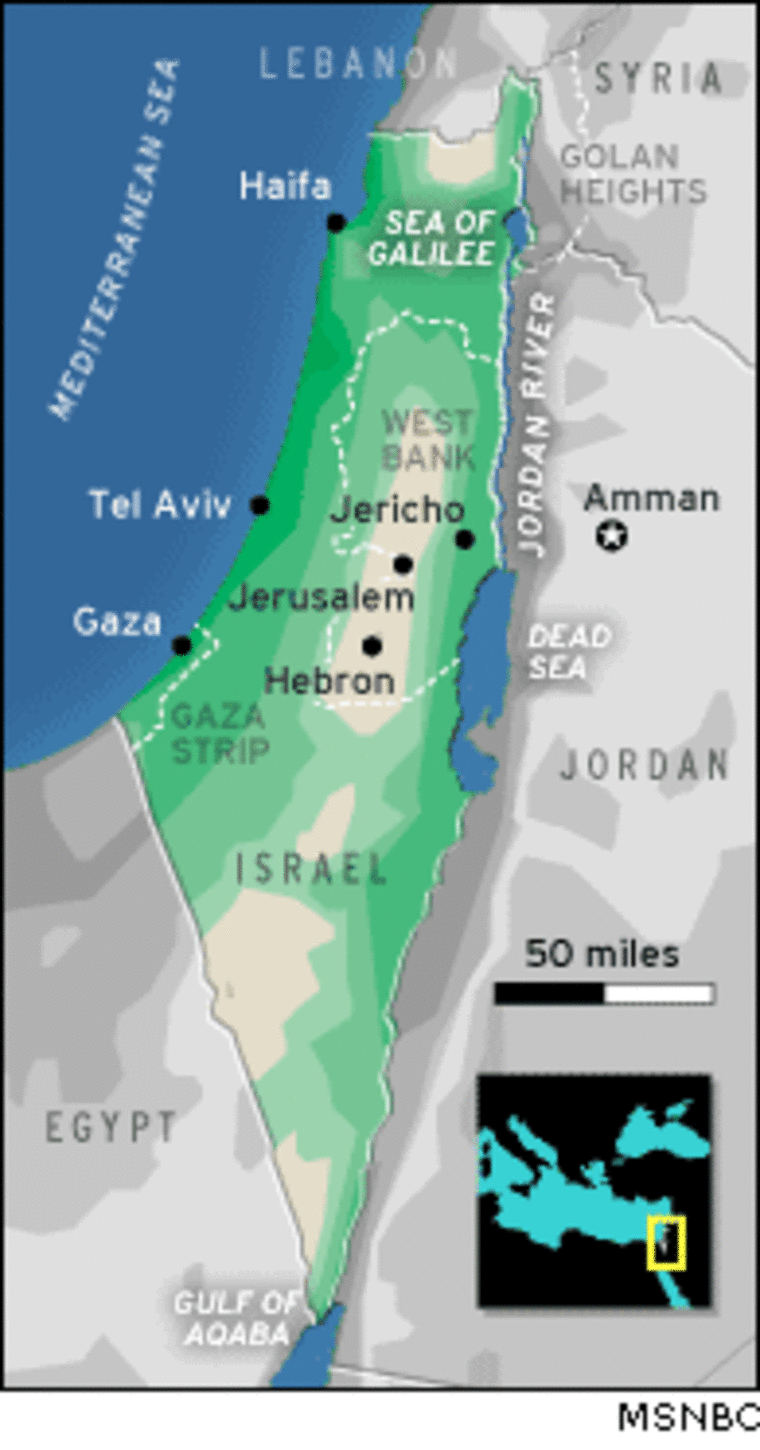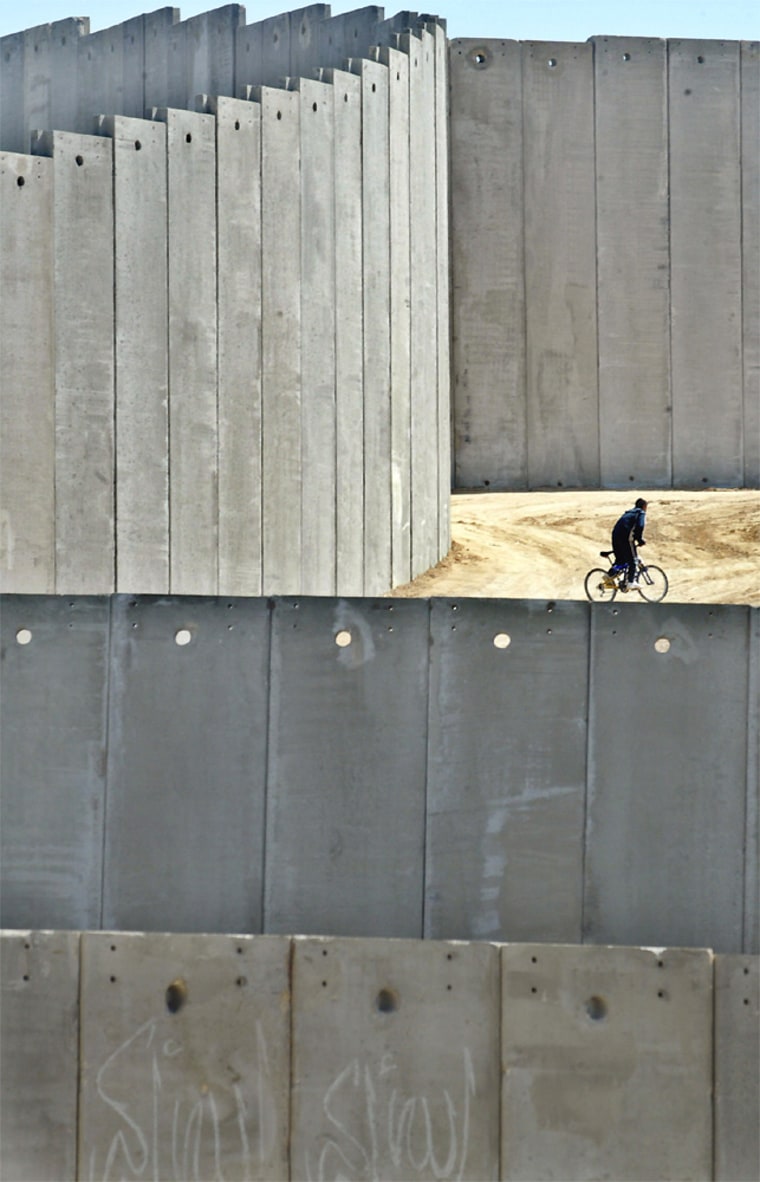Israel’s defense minister endorsed a plan Monday to speed up checks at West Bank roadblocks but also make them more permanent — a sign that crippling travel restrictions on Palestinians will not be lifted soon.
The plan includes a code of conduct for soldiers, high-tech devices and a special lane for ambulances, VIPs and foreigners, according to a Defense Ministry statement.
One Israeli army commander recommended this week that Israel use millions of dollars confiscated from Palestinian banks to improve roadblocks, but it was not clear whether Defense Minister Shaul Mofaz adopted the idea.
Israel set up dozens of roadblocks in the West Bank after Palestinian-Israeli violence erupted in 2000 to keep militants from reaching Israel. Soldiers enforce frequent curfews and travel bans, crippling movement in the territory and harming the Palestinian economy.
'Humanitarian improvements'
Palestinians often wait in long lines to be checked. Human rights groups have complained about Israeli abuses, chronicling cases of ambulances being held up or of soldiers beating innocent Palestinians. Israel has admitted wrongdoing some cases, denying others or attributing them to security needs.
Israel insists the roadblocks are needed to stop suicide bombers and other Palestinian attackers. Suicide bombers have killed more than 450 Israelis. Altogether, in 41 months of fighting, over 2,700 people have been killed on the Palestinian side and 930 on the Israeli side.
Mofaz’s move to upgrade the roadblocks comes at a time when Israel is proposing a pullout from all or most of the Gaza Strip if peace talks remain stalled. Palestinians fear such a withdrawal will be accompanied by a concerted Israeli effort to dig into major parts of the West Bank.
The Defense Ministry statement said the changes were meant “for humanitarian improvements for Palestinians in West Bank,” but also included “transforming all roadblocks into regular crossing points/terminals governed by a work plan,” language that indicates permanence.
The ministry did not immediately respond to a request for clarifications.
Among the planned improvements are high-tech devices for identifying people to speed up passage — a significant investment for an army hard hit by government budget cuts and another sign of a long-term project.
Another aspect of the plan is to alter the route of Israel’s contentious separation barrier, also meant to stop bombers. The statement said humanitarian factors would be taken into account.
Palestinians complain that the planned route of the barrier cuts deep into the West Bank and encircles towns and villages, cutting tens of thousands off from their fields, schools and services.
They charge that the real purpose of the complex of fences, walls, trenches and barbed wire is to prevent them from creating a state.
The Defense Ministry statement said gates in the barrier, meant to allow farmers access to their lands, would be open longer. Farmers complain that in the section already completed, along the northern section of the West Bank, the gates are frequently closed.
Hamas in limelight
The militant Palestinian group Hamas threatened revenge after 14 Palestinians were killed in the deadliest Israeli raid in Gaza in 17 months — part of an upsurge in bloodshed linked to a proposed Israeli withdrawal from the coastal strip.
Among the dead were 11 militants and three boys between the ages of 8 and 15, and 81 people were wounded. The fighting near the Bureij refugee camp Sunday pitted hundreds of Palestinians with assault rifles, anti-tank missiles and grenade launchers against Israeli snipers and troops firing from helicopters and tanks.

In new fighting Monday, a 16-year-old Palestinian was killed by army fire.
Israeli troops also entered the West Bank town of Salfit on Monday to arrest a suspect, but his neighbor, 34-year-old grocer Khaled Mahdi, was killed by a stray bullet, his relatives said. The military had no immediate comment.
Meantime, Hamas claimed responsibility for a suicide bombing in Tel Aviv on April 30, 2003, after denying it for nearly a year.
Two bombers who came from Britain infiltrated from Gaza into Israel. One blew up Mike’s Place, a popular night spot, killing three people, and the other was found dead on a nearby beach two weeks later.
Hamas said the pub bombing was a message to Israel that the group “has many options to fight against you as long as you are occupying our land and committing massacres against our people.” All the other suicide bombings in Israel originated in the West Bank.
Hamas also released a farewell video in which one of the Britons, Asif Hanif, 21, from a London suburb, launched into a tirade in English against Israel and what he said was a world indifferent to Palestinian suffering.
